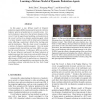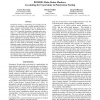250 search results - page 39 / 50 » Learning action effects in partially observable domains |
96
Voted
NECO
2007
14 years 11 months ago
2007
Learning agents, whether natural or artificial, must update their internal parameters in order to improve their behavior over time. In reinforcement learning, this plasticity is ...
120
click to vote
CVPR
2012
IEEE
13 years 2 months ago
2012
IEEE
In this paper, a new Mixture model of Dynamic pedestrian-Agents (MDA) is proposed to learn the collective behavior patterns of pedestrians in crowded scenes. Collective behaviors ...
83
Voted
AAAI
2012
13 years 2 months ago
2012
Penetration Testing is a methodology for assessing network security, by generating and executing possible hacking attacks. Doing so automatically allows for regular and systematic...
155
click to vote
CSL
2012
Springer
13 years 7 months ago
2012
Springer
Reinforcement techniques have been successfully used to maximise the expected cumulative reward of statistical dialogue systems. Typically, reinforcement learning is used to estim...
AIPS
2006
15 years 1 months ago
2006
We present a new algorithm for probabilistic planning with no observability. Our algorithm, called Probabilistic-FF, extends the heuristic forward-search machinery of Conformant-F...


